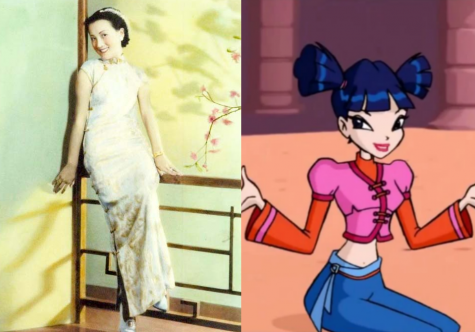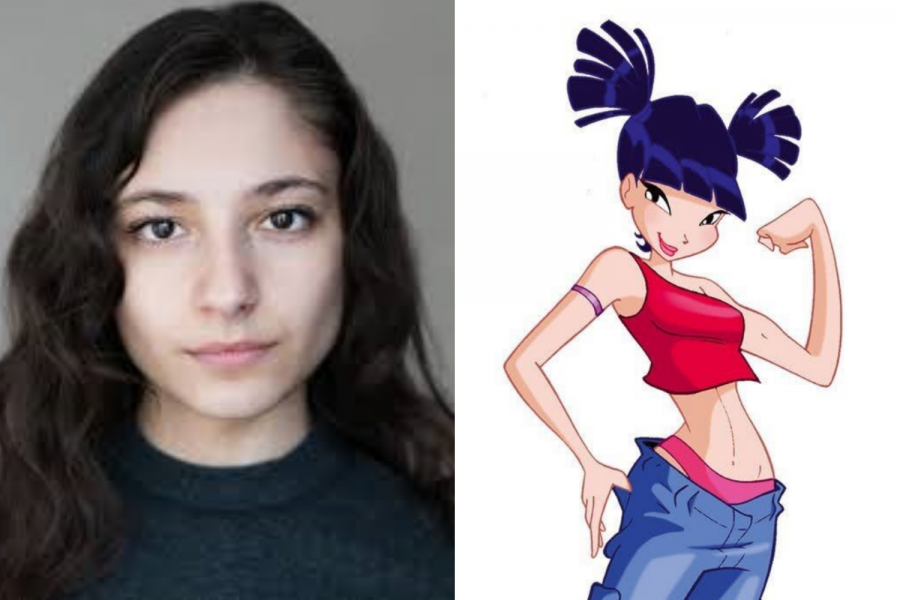Netflix’s “Winx Club”: Perpetuating racism in the entertainment industry
Credit: Revolution Talent (Left)
Elisha Applebaum (Left), a European-Singaporean actress, has been cast to play Musa (Right) in the live action Winx Club reboot. Netflix has been involved in many controversies regarding their self-produced releases, being accused of white-washing, queer-baiting and appealing to child predators.
January 22, 2021
Racism in entertainment has been prevalent for centuries and only recently has begun to be rectified, but even with the removal of legal barriers, people of color still face challenges when it comes to representation in media.
Netflix recently announced the premiere date for their live-action reboot of the 2000’s animated Nickelodeon show “Winx Club” to be Jan. 22, releasing the series trailer alongside it.
The original magical girl-esque show, which initially aired in the US from 2004-2009, attracted a large audience of primarily young girls, but the reboot is looking to give it a darker tone akin to how “Riverdale” adapts the “Archie” comic series. However, higher ups in production seem to have lost sight of this goal when it came to casting choices, instead opting to white-wash two of the core characters.
Most fans of the show will recall the characters of Musa and Flora. In the original, while the facial features don’t vary greatly due to the nature of the art style, Musa’s eyes are noticeably thinner than some of the other cast members. This alone would not indicate her to be of East Asian origin, but she is also regularly seen wearing outfits that are very clearly inspired by traditional Chinese clothing.

In addition, Musa has her bangs styled in a Hime cut, a hairstyle originating from Japan that was traditionally worn by noble women but has since become popular in many of the surrounding countries. Her appearance is also reportedly based on the actress Lucy Liu, a Chinese actress.
Flora’s race isn’t nearly as evident as Musa’s in the original show, but her skin is noticeably darker than the white cast members, is based off Latina celebrity Jennifer Lopez and she has been widely accepted by fans to be Latina. On the highly popular fan-made Winx Club Wiki, it is stated she is “a young tan-skinned Latina woman.”
The actress portraying Musa in the reboot is Elisha Applebaum, a part Singaporean-part European actress. While the inclusion of more actors of color is important, east Asian people in particular are often treated as interchangeable despite the drastic differences between them in history, culture, appearance and language. Whether by ignorance, apathy or malice, this form of bigotry manifests itself far too frequently in both entertainment and society at large and is reflected in the choice to cast a Singaporean actress in the role of a Chinese character.
While Applebaum is Singaporean, she is also mostly European. This is why many fans feel Musa has been whitewashed rather than just swapped for a person of a different east Asian origin. While the criticism is valid, it raises another concern.
Mixed race people face unique hardships of their own; the feeling of not being ‘enough’ of one race and not feeling entitled to take part in their heritage is a common sentiment. This is not a sentiment this article wishes to perpetuate by pointing out that Applebaum is largely European and casting her in the role of a character who is, in the original, fully Chinese is not a faithful depiction or representation of her identity and perpetuates the practice of white-washing Asian characters. This practice is incredibly frequent in the entertainment industry, most commonly seen when Japanese media is adapted into a live-action release.
Recent examples include the 2017 live-action “Death Note” adaptation and 2017 live-action “Ghost in the Shell” adaptation, with the former also being produced by Netflix. The original media of both releases have explicitly Japanese leads with white actors portraying them in the live-action releases.
This practice is a holdover from times when Asian people were legally blocked from being performers in the United States, and the continuation of this trend is not only a perpetuation of racist policies and insulting to the plethora of incredible Asian actors, but often leads to parts of the story either not making sense or having to be rewritten for the white actor. It is frankly inappropriate to co-opt stories about Asian people in Asia with Asian influences and insert white people as the focal point.
While this issue is most often discussed in regards to Asian and black people, it happens to people of all races. In this case, a Latina character. The character representing Flora is renamed Terra in the reboot, but from the available information, she appears to be the same character based on the type of magic she performs and the role she fulfills. While some would argue that this makes her a new character and therefore not white-washed, they have still removed a person of color from the main cast and continue to feed into the enduring racism in entertainment.
Race-blind casting in and of itself is not an issue as long as it goes both ways, but the only actress of color in the Winx Club reboot that has been revealed plays a character who is originally black. Faithfully casting her to keep the identity of the character intact is not inherently negative, but the choice to cast a single person of color amongst an all-white cast is very reminiscent of tokenism: the practice of performing an insignificant action to prevent criticism and give the appearance of diversity. For example, hiring a single gay person or casting a single person of color in a show rather than actually making an effort to be inclusive and sensitive to people of all backgrounds.
In addition to the racism reflected in the casting choices, the new reboot has also faced backlash for the complete removal of Techna, a main cast character. There is also backlash for the shift in narrative tone and the dullness of the setting and character design in comparison to the brightly colored, glitzy animation style that the original took on. However the overarching criticism has been mostly in regards to the blatant disrespect and racism that the casting choices reflect.













T.J. • May 9, 2021 at 8:42 pm
No, the lead in Ghost in the Shell is a Japanese woman IN a synthetic CAUCASIAN body. Please pay more attention before accusing people of racism.
Jennie • Apr 19, 2021 at 2:02 pm
I would just like to say that before I let out some thoughts, please do not mistake what I have to say for perpetuating the notion that white washing should be overlooked. It most definitely should not, and I am totally here to back up the fact that diversity and whitewashing on TV are still huge issues. However, I think the backlash Applebaum has received for this role has been mildly unnecessary. If she is in fact partially Singaporean-Chinese, then this shouldn’t be overlooked. She should still feel welcomed in Asian spaces and not dismissed for being more white passing – which you made a good point of raising respectfully. When reading some of the comments under a youtube video, I couldn’t help but feel quite let down. Are people really attacking a young actress for being a basic white girl? Some claim that her being of partial SG-chinese descent was just a rumour.
I can only say that looking at the actress’ appearance, I can’t see a text book definition of a white girl. This is just straying further away from the initial topic of this conversation, but society has got to stop assuming that white is the default. Asians look diverse too. And in my honest opinion, deserve to play Asian roles not limited to their exact ethnicity. I don’t think an Indonesian actress, for instance, should wait around until a specific role was created for her background? If she fits the bill to play an Indian character, why ever not as long as she isn’t the only person on-screen who represents Indian people?
I fully realise that this isn’t exactly the case with Applebaum. Netflix could have done drastically better. Musa’s character is distinctively Chinese and was based off of a real, full Chinese woman. The backlash, you could say, was expected and at least mostly justified. Let’s just not forget that there are Asian people who do not fit the exact mould of what Asian looks like in one’s mind. I say all of this as someone of Asian descent, myself.
Mary • Jan 31, 2021 at 12:23 am
Just a slight correction to the above article, the show is originally Italian & wasn’t purchased by Nickelodeon until roughly 2011. To me, the Netflix adaption does seem like a very dark, Americanized version of the show & I do wish they had stayed a little closer to the original content, especially in regards to accurate representation.
Hunter • Jan 28, 2021 at 11:07 am
It’s articles like this that perpetuate racism. People are enjoying the show and more of this type of writing is so unnecessary. It is just virtue signalling by a young (white) writer who is still at school, to whip up some views on an article, and to show how progressive (woke) she is.
People of other ethnicities don’t need your help. Maybe Elisha Applebaum was just the best actor for the job, no conspiracies at play. Did you approach Elisha Applebaum to be able to comment, did you ask her about her take on the subject?
I think maybe you should get some more life experience before you denigrate countless people, put people’s livelihoods at risk, and make assumptions of which you know nothing about, all because you don’t seem to be happy that it is not exactly the same as your favourite cartoon used to be.
Yangki • Sep 19, 2022 at 8:51 pm
This is not her own opinion but the opinions she has found online by fans and viewers of the show. I as an asian woman did find the casting of Musa and Flora to seem like whitewashing. Musa’s actress is 1/4th from Singapore but she is 3/4th jewish and from the UK. She doesn’t look east asian at all and if they wanted middle eastern or jewish representation on the show it should not take away the 1 and only east asian character on the main cast that’s been there since the original show. China’s population alone is 18% of the whole world population, not considering people of chinese descent in other countries as well as all the other east asian countries. I am not chinese myself but would have liked a chinese actress or at least of east asian descent that is passing for east asian. It’s disappointing as Musa’s actress is part asian and of a minority(jewish) she is ok with her being cast as Musa as she knows how hard it is to find representation on popular shows. I would have been very happy to see her as any other role on the main cast, but this makes the show very hard to watch for me personally.
Yangki • Sep 19, 2022 at 8:54 pm
Also btw this is a school publication by students. If you don’t care for articles made by people still in school, no one is forcing you to read the articles here.
Hmmm. • Sep 23, 2022 at 4:20 pm
People read articles to be informed and discuss. Also no one forced you to read the reply… and yet you did.
Violet • Jan 26, 2021 at 1:22 am
I definitely agree that the casting could have been better, but I do think it’s a little disingenuous to say that she’s 3/4s white/European. Yes her family lives in England but they’re Jewish. There’s a big difference between Jewish people and Europeans. Yes Jewish people have been smattered across Europe for several hundred years, but they’ve been austricized that entire time and have been forced to live separately from Europeans. It’s a diaspora. Yes Jewish people can vary in complexion and often pass as white especially if they’re mixed with white people, but they aren’t white. They are however quite marginalized. Antisemitism is still very prevalent and didn’t suddenly stop after the holocaust. Both my bubbie and zaidie (Jewish grandma and grandpa) had their families murdered, and their homes stolen during the holocaust by white people, and were forced into Palestine by white people who were happy to take credit for “saving” them by ending the war, but who didn’t want them in any of their white countries afterwards and were more than happy to keep all of their stolen lands and possessions. So please don’t equate us with white people just because some of us have fairer complections. Elisha is 1/4th singaporean and 3/4ths Jewish. She isn’t white. That doesn’t mean I don’t think they should have cast a full Chinese person in the roll, and minorities definitely aren’t interchangeable. But you can be upset at the casting without painting her as something she’s not. That being said you were definitely a lot more fair to her than a lot of other people are being, but it’s really frustrating seeing everyone dub her casting as whitewashed when she isn’t white at all.
Ricx • Jan 25, 2021 at 1:13 am
Hello, thank you for pointing out some key things and struggles in the industry for people of the world majority! One thing I would like to point out that I disagree with is when you say casting a Singaporean in a Chinese role is not ok, that it is assuming all East Asians as interchangeable. I disagree because Singaporean Chinese ARE Chinese, just south East Asian Chinese and not mainland Chinese. From what I understand Elisha is SG Chinese, not another SG race (we have four main ethnicities). I could see the issue if a Korean was cast to play a Chinese character but as a Singaporean Chinese myself, and also half white, seeing Elisha play Musa is actually pretty nice and mixed race person like me feels seen in a character like her. Granted, I agree that the casting directors would do even better to cast someone who is full Chinese or East Asian because there are those actors out there, if original Musa is intended to be fully Chinese 🙂